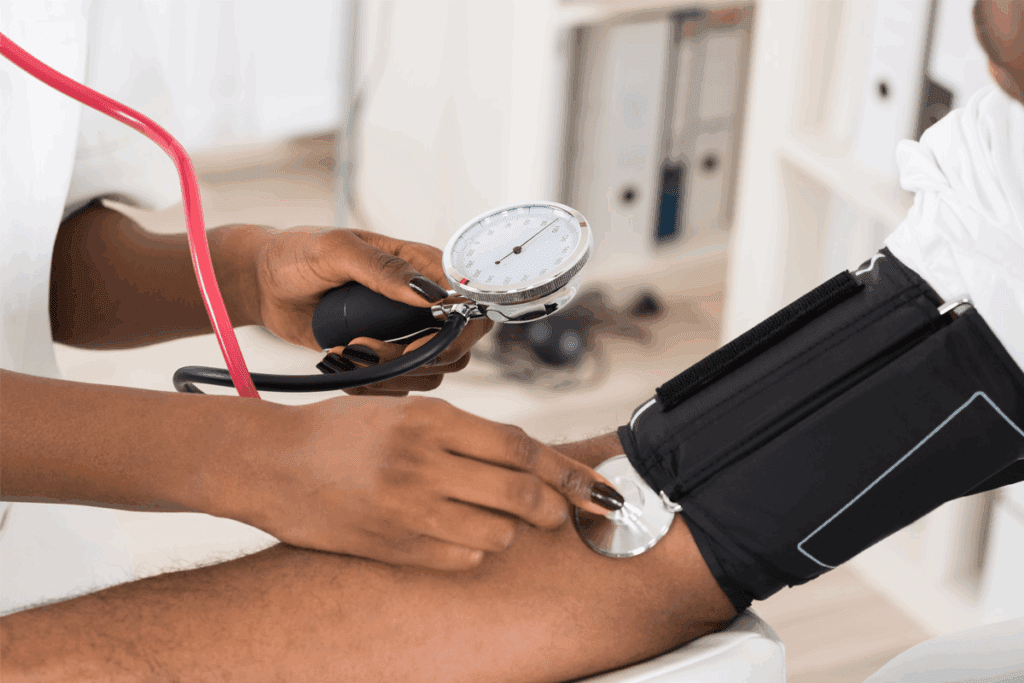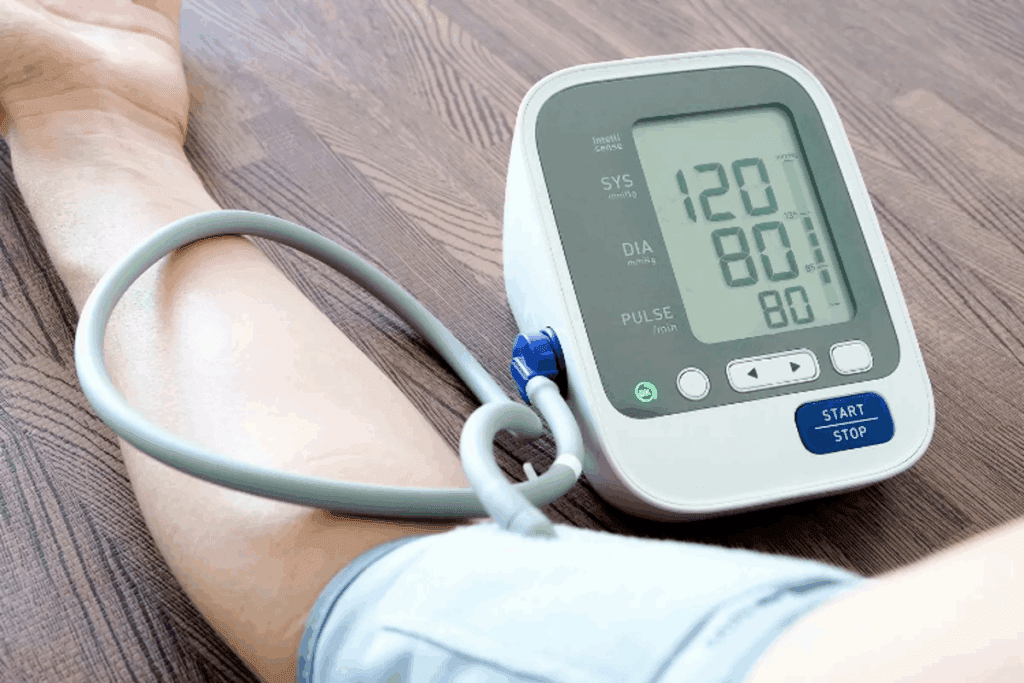Last Updated on November 25, 2025 by Ugurkan Demir

High blood pressure is a big worry for young adults. It’s caused by many things like lifestyle, genes, and health issues. Almost half of U.S. adults have high blood pressure but don’t even know it. This can lead to heart attacks and strokes.
Discover what causes high bp in young adults and how to control it early.
At Liv Hospital, we know how important it is to control blood pressure. We offer reliable, patient-centered ways to prevent and treat it. Knowing the risks and acting early can greatly improve your health.

Hypertension is becoming more common among young adults. It’s important to know why and what it means. Young adults are now facing this health issue more than ever before.
About 1 in 8 adults between 20 and 40 have high blood pressure. This is a big change from when it mostly affected older people. The rise is worrying because it can lead to serious health problems like heart disease and stroke.
In 2023, high blood pressure caused 664,470 deaths in the U.S. Many of these deaths could have been prevented. The number of young adults with high blood pressure varies. It depends on things like lifestyle, family history, and where they live.
Key statistics highlighting the prevalence include:
Finding high blood pressure early is key. It lets doctors start treatment right away. This can prevent serious problems like heart disease and kidney failure.
The benefits of early detection include:
Young adults can lower their risk of health problems by being aware and making healthy choices. We need to spread the word about the importance of regular health checks and a healthy lifestyle.

High blood pressure in young adults is often linked to lifestyle choices. Making better choices can help manage blood pressure.
Being overweight is a big risk for high blood pressure. Extra weight, mainly around the belly, strains the heart. This can raise blood pressure.
Even losing 5-10% of body weight can improve blood pressure. A balanced diet and exercise are key for lasting weight loss.
| Weight Loss Strategy | Impact on Blood Pressure |
| Dietary Changes | Reduces sodium intake, increases potassium |
| Regular Exercise | Improves cardiovascular health, aids in weight loss |
| Combination Therapy | Enhanced weight loss, improved overall health |
Sitting too much can also lead to high blood pressure in young adults. Exercise makes the heart stronger. This helps it pump blood better, lowering pressure.
Recommended Physical Activities:
Doing at least 150 minutes of moderate exercise or 75 minutes of vigorous exercise weekly can lower hypertension risk.
Young adults can fight high blood pressure by tackling obesity and inactivity. A healthy lifestyle, including diet and exercise, is vital for heart health.
Knowing what foods raise blood pressure is key to heart health. The foods we eat greatly affect our blood pressure. Making smart food choices can lower the risk of high blood pressure.
Too much sodium is a big risk for high blood pressure. High sodium levels can make blood vessels narrow and blood pressure go up. The American Heart Association says to keep sodium under 2,300 milligrams a day. Be careful of sodium in processed and restaurant foods, as they can add up quickly.
Tips to reduce sodium intake:
Drinking too much alcohol can also raise blood pressure. Alcohol can make blood vessels narrow, cutting off blood flow to important organs. The Dietary Guidelines for Americans suggest men drink no more than two drinks a day, and women no more than one.
Effects of excessive alcohol consumption:
| Effects | Description |
| Vasoconstriction | Constriction of blood vessels, reducing blood flow |
| Increased Blood Pressure | Raising blood pressure due to increased vascular resistance |
| Cardiac Complications | Increasing the risk of heart disease and stroke |
Eating a lot of red meat can also increase blood pressure risk. Red meat is often full of saturated fats, cholesterol, and sodium. It’s better to choose lean proteins and eat more plant-based foods.
By watching what we eat and avoiding too much sodium, alcohol, and red meat, we can help manage blood pressure. A healthy diet, regular exercise, and a good weight are all important for heart health.
Exploring what raises blood pressure, substance use is key. Certain substances can directly affect our blood pressure, leading to high blood pressure.
Substance use includes many behaviors. But, tobacco and nicotine products, and illegal drugs are major concerns. Both are linked to higher blood pressure and heart risks.
Tobacco use, like smoking, is a big risk for heart disease. It damages blood vessel linings, making them narrow and block. This raises blood pressure.
Nicotine, the main tobacco substance, also tightens blood vessels. This adds to high blood pressure.
Quitting tobacco use greatly lowers heart disease and stroke risks. Quitting soon brings big health benefits.
Illegal drug use also affects blood pressure. Drugs like cocaine and amphetamines raise blood pressure because they stimulate the body. They can cause heart attacks and strokes, even in the young.
Illegal drugs can also lead to long-term heart problems, like high blood pressure. Different drugs affect blood pressure in different ways, but the risks are clear.
We need to understand substance use risks. Knowing how tobacco, nicotine, and illegal drugs affect blood pressure helps fight high blood pressure in young adults.
Psychological factors greatly influence blood pressure in young adults. The mind and body are closely linked. Different mental states can affect heart health.
Chronic stress can raise blood pressure. Stress triggers our “fight or flight” response, releasing hormones like cortisol and adrenaline. These hormones help us react to stress, but constant levels can harm blood pressure.
Managing stress is key to keeping blood pressure in check. Activities like meditation, deep breathing, and yoga can help. Regular exercise and a healthy diet also boost stress resilience.
Anxiety and depression can also affect blood pressure. These conditions can make our nervous system more active, raising blood pressure. People with these conditions might also make unhealthy choices, like bad diets or not exercising enough.
Dealing with anxiety and depression requires a full approach. This includes seeing a mental health professional, making lifestyle changes, and sometimes taking medication. By tackling these issues, people can also manage their blood pressure.
The table below shows how different psychological factors can impact blood pressure:
| Psychological Factor | Impact on Blood Pressure | Management Strategies |
| Chronic Stress | Increases blood pressure through sustained release of stress hormones | Meditation, deep breathing, yoga, regular exercise, balanced diet |
| Anxiety | Can lead to increased sympathetic nervous system activity, raising blood pressure | Mental health support, lifestyle changes, stress management techniques |
| Depression | May result in unhealthy behaviors and increased blood pressure | Professional mental health support, medication, lifestyle changes |
Knowing what can quickly raise blood pressure is key to managing high blood pressure. Several things can cause blood pressure to jump up right away. Knowing these can help people take steps to prevent it.
Doing very hard physical activity can make blood pressure go up. While regular exercise is good for your heart, very hard workouts can cause a sudden spike. This is true for people with high blood pressure or those who don’t usually do hard exercise.
For example, activities like weightlifting, sprinting, or HIIT can make blood pressure go up a lot during the activity. It’s important to watch how your body reacts and talk to a doctor if you’re worried.
Caffeine and other stimulants can quickly raise blood pressure. Caffeine, found in coffee, tea, and some medicines, can make the heart work harder and narrow blood vessels, leading to higher blood pressure. Also, stimulant drugs, whether they’re prescribed or not, can have a big effect on blood pressure.
Acute stress, whether it’s physical or emotional, can quickly raise blood pressure. The body’s “fight or flight” response, triggered by stress hormones like adrenaline, gets ready to face threats by increasing heart rate and blood pressure.
“Chronic stress can have a big impact on heart health, and acute stress reactions can be very dangerous for people with heart problems.”
Managing stress with meditation, deep breathing, or yoga can help. Also, checking blood pressure regularly can help spot stress-related spikes.
Checking blood pressure often can help find out what causes it to spike. By understanding and managing these triggers, people can better control their blood pressure and lower the risk of heart problems.
We often overlook the underlying medical conditions that contribute to high blood pressure. Certain health issues can significantly impact our blood pressure, making it essential to manage these conditions effectively.
Managing underlying medical conditions is key to controlling high blood pressure. We will explore how kidney disease, diabetes, and sleep apnea can affect blood pressure.
Kidney disease is a significant contributor to high blood pressure. The kidneys play a vital role in regulating blood pressure through various mechanisms, including fluid balance and hormone regulation. When the kidneys are damaged, it can lead to an increase in blood pressure.
Diabetes is another medical condition that can cause high blood pressure. High blood sugar levels can damage blood vessels and nerves, making it harder for the body to regulate blood pressure. Managing diabetes through lifestyle changes and medication can help mitigate its impact on blood pressure.
Sleep apnea is a sleep disorder characterized by pauses in breathing or shallow breathing during sleep. It can lead to high blood pressure due to the repeated interruptions in sleep patterns, leading to stress on the body. Treating sleep apnea can help reduce blood pressure.
By understanding and managing these medical conditions, we can take significant steps towards maintaining healthy blood pressure. It’s essential to work with healthcare professionals to diagnose and treat these conditions effectively.
Some medicines can make blood pressure go up. It’s important to know which ones can do this. While medicines help with many health issues, some might raise blood pressure. Knowing this helps us take care of our health better.
Birth control pills and hormonal treatments can raise blood pressure in some women. Estrogen-containing contraceptives are known to do this. This effect usually goes away when you stop taking them. It’s key for women on these pills to get their blood pressure checked often.
The American Heart Association says women on oral contraceptives should have their blood pressure checked often. High blood pressure can lead to heart diseases. If your blood pressure goes up too much, your doctor might suggest other birth control options.
Some OTC medicines can also increase blood pressure. Nonsteroidal anti-inflammatory drugs (NSAIDs) like ibuprofen and naproxen can do this, mainly when taken in large amounts or with other medicines. Also, decongestants in cold and allergy meds can have the same effect.
| Medication Type | Potential Effect on Blood Pressure |
| NSAIDs (e.g., ibuprofen, naproxen) | Can increase blood pressure |
| Decongestants (e.g., pseudoephedrine) | Can raise blood pressure |
Some prescription medicines can also lead to higher blood pressure. Corticosteroids, used for inflammation and autoimmune diseases, can cause fluid retention and increase blood pressure. Some antidepressants and antipsychotics might have this effect too.
Talking to your doctor about your medicines is very important. They can help you understand the risks and benefits. If your medicines might be raising your blood pressure, your doctor might change your dosage or suggest other options.
Knowing how different medicines can affect blood pressure helps us work with our doctors better. Regular checks and talking openly are key to handling these risks.
It’s important to know how genetics and gender play a part in managing high blood pressure in young adults. High blood pressure is a complex issue. It’s influenced by many factors, including genetics and gender differences.
A family history of high blood pressure is a big risk factor. Genetic factors can make people more likely to get hypertension. They can affect how the kidneys work and how blood vessels respond.
Studies show that people with a family history of hypertension are more at risk. This highlights the need for early monitoring and prevention for those at genetic risk.
| Risk Factor | Description | Impact on Blood Pressure |
| Genetic Predisposition | Inherited traits affecting blood pressure regulation | Increased risk of developing hypertension |
| Family History | Presence of hypertension in first-degree relatives | Higher likelihood of developing high blood pressure |
| Gender-Specific Factors | Differences in blood pressure regulation between genders | Varying risk profiles for men and women |
Women can get high blood pressure for many reasons. Hormonal changes and pregnancy complications are big ones. Hormonal fluctuations during menopause or with certain birth control can raise blood pressure.
Pregnancy can also cause high blood pressure, leading to serious issues like preeclampsia. It’s key to understand these gender-specific factors. This helps in giving the right care and management for women at risk of hypertension.
Managing blood pressure is key for long-term health. Many things can affect blood pressure, like lifestyle, health conditions, and genes. Knowing these can help us manage high blood pressure well.
Keeping blood pressure in check can lower the risk of heart disease and stroke. We suggest a healthy lifestyle. This includes eating right, staying active, and managing stress to keep blood pressure healthy.
By making smart choices and getting help from doctors, we can manage blood pressure. This helps prevent heart disease and improves our health overall.
Several key factors contribute to high blood pressure in young adults. Lifestyle choices like obesity, physical inactivity, and diet are important. Substance use, psychological factors, and certain medical conditions also play a role.
Obesity is a big risk for high blood pressure. Excess weight can cause insulin resistance, inflammation, and vascular dysfunction. These issues can raise blood pressure.
Yes, a healthy diet can help manage high blood pressure. Eat less sodium, saturated fats, and added sugars. Choose more fruits, vegetables, and whole grains.
Chronic stress can increase blood pressure. It releases stress hormones like cortisol and adrenaline. These hormones can raise blood pressure and heart rate.
Family history is important in high blood pressure. Certain genetic factors can affect blood pressure regulation. This increases the risk of hypertension.
Yes, some medications can raise blood pressure. This includes over-the-counter and prescription drugs. Always talk to your healthcare provider about your medications.
Intense exercise can temporarily raise blood pressure. It’s important to check your blood pressure before, during, and after exercise. Regular exercise is good for blood pressure, though.
Women face various risks for high blood pressure. Hormonal changes, pregnancy, and certain medical conditions are factors. It’s key for women to know their individual risks.
Yes, sleep apnea is a risk factor for high blood pressure. It can cause inflammation, oxidative stress, and cardiovascular damage.
Manage your blood pressure with a healthy lifestyle. Eat well, exercise regularly, manage stress, and check your blood pressure often. This can help reduce hypertension risks.
Yes, some people may be more at risk for high blood pressure. This can be due to genetics or environment. Knowing your risk factors is important for managing blood pressure.
Intense exercise, caffeine, and acute stress can quickly raise blood pressure. Being aware of these factors and managing them is key.
National Center for Biotechnology Information. (2025). 15 Factors That Increase Blood Pressure in Young. Retrieved from https://pubmed.ncbi.nlm.nih.gov/37187665
Subscribe to our e-newsletter to stay informed about the latest innovations in the world of health and exclusive offers!